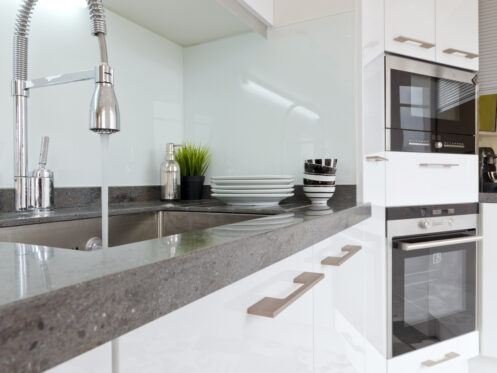Most water flowing into our homes is relatively safe for human consumption, and we have a significant degree of trust in the sources and the treatment it has passed through. However, many property owners go the extra mile to install whole-house water filtration systems, an investment that acts as an extra layer of protection against harmful contaminants.
Water filtration systems are also referred to as Point-of-Entry (POE) systems. They differ from the point-of-use (POU) system, which refers to filtration systems installed under sinks, showers, and other water-releasing endpoints. Several whole-house water filtration systems include:
- Sediment filters
- Softeners and conditioners
- Catalytic carbon filters
- Activated carbon filters
- UV filters
- Calcite filters, among others
Whole-house filtration systems offer various advantages. However, for better service, it’s essential to know what each system offers and why choosing the right one offers the best fit. We’ve highlighted some considerations you should make when choosing a water filtration system.
1. Analyze Your Water Supply
The primary purpose for installing a whole-house water filter is to remove impurities. But you will be making a gainless effort if you don’t know the specific impurities you seek to remove from the water flowing into your house.
Analyzing your water supply helps you identify the impurities you are dealing with and subsequently choose the most appropriate filter. Water from a well may have different contaminants from that flowing from a river, and the kind of filtration needed will be determined by what the impurities contain. For water supplied by the government, local authorities can provide you with a Water Quality Index (WQI) report, which then informs your choice of a filtration system.
2. Purpose of Filtration
Filtration can be done for simple domestic use or at a commercial scale. The devices vary depending on what you want to achieve. Before choosing a whole-house water filtration system, evaluate your needs and the overall water usage.
This evaluation will also help you to determine whether you need a storage facility for filtered water or it will get directly to the taps. The best way to go around this is to find out daily water consumption needs for laundry, kitchen, bathroom, and so on. Once you determine your household’s needs, you can pick the right system to serve you without glitches.
3. Understand the Flow Rate
The flow rate refers to the amount of water dispensed through various channels, including showers, dishwashers, water heaters, and other appliances. It is measured in gallons per minute (GPM). As a rule of thumb, the water flowing from all taps and appliances shouldn’t be beyond the flow rate of the water filtration system. This means that if your whole-house water filtration system releases 10 GPM, it will not function optimally against a household demand of 20 GPM. Most households have a range of 15-40 GPM.
Our experts at Bumble Breeze can guide you on how to go around this technical aspect to ensure you achieve the expected outcome. Our clients across Las Vegas and surrounding neighborhoods have trusted us to provide experts in installing and maintaining whole-water filtration systems and other HVAC tasks. We offer several services to ensure water flows smoothly, including repiping, sump pump repairs, and leak detection.
4. Know the Filter Size
Large filters work better since their water output and pressure are higher. Ideally, a filter measuring 4.5×20 inches is capable of serving an average household. A larger filter would be most appropriate for households with a flow rate above 25 GPM. The idea is to ensure that you are sufficiently controlling the water coming into your filtration system without affecting supply into various dispensing channels.
5. Find Out the Filter Life
The lifespan of a whole-house filtration system is determined by several factors, including the sediments found in the water you aim to filter. In addition, the amount of water that will eventually go through the filtration system will also play a role in determining how long it lasts. Reduced water pressure may indicate that the filter needs to be changed.
To better manage the filtration system, keep a good record of filter changes and other maintenance activities. This will help you maintain a routine and know when to change your filters. Ultimately, such a routine ensures that your system serves you for longer.
6. Look Out for Available Options
The market has several options available, each offering certain advantages. As you shop around for a whole-house water filtration system, ensure that you compare a number of options and learn from the vendors and manufacturers what each offers over the other. One aspect that you can use to pick a vendor is looking at the after-sale support that they guarantee. This may include replacing the filters at a subsided price.
7. Certification By the National Sanitation Foundation
A water filtration system has a direct impact on the water being consumed in a household. For this reason, it should uphold the highest standards of performance and certification. Before purchasing a filtration system for your household, ensure it’s certified by the National Sanitation Foundation (NSF). A system that is NSF-certified gives an assurance that it meets several safety standards. For instance, you are guaranteed that it’s constructed using only FDA-approved raw materials and that it meets safety, design, construction, and performance standards, having passed through rigorous testing. You can also be sure that harmful chemicals will be eliminated since prerequisite standards have been met.
8. Seller and Manufacturer Credibility
Purchasing from a seller who upholds high integrity gives you the confidence that the product is up to standard. Several things could go wrong if you purchase a subpar water filtration system. With this in mind, purchase your filtration system from a seller or manufacturer whom you can trust. One way of gathering more information is by checking for reviews online and offline referrals. In fact, most sellers and manufacturers display NSF certification as a mark of quality, giving buyers more confidence in quality.
9. Budget
How much are you willing to spend on a filtration system? While the up-front cost may be affordable, you must consider maintenance costs such as change of filters. Generally, filters are affordable, but the overall cost is determined by a combination of factors, particularly how much you will send over its lifespan. Furthermore, the kind of sediments and contaminants in your water may also determine the cost of your filter and other additional necessities.
Whole-house water filtration systems are a good way of keeping your water clean, especially when you are looking for an all-round solution. Before settling on the appropriate option, ensure that you weigh your needs and requirements. Furthermore, it’s essential that you consult an expert to help you make a better choice.
Bumble Breeze is a locally owned family business with more than 15 years of experience in serving customers in the Las Vegas area. We are your go-to company for all HVAC and plumbing solutions. Call Bumble Breeze today or reach us through our social media pages and enjoy unmatched warranties, discounts, and guarantees for a wide range of services.


